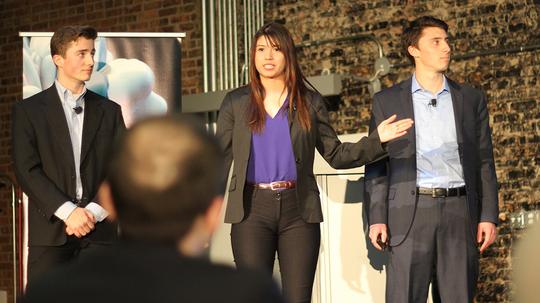
Entrepreneurship will exist wherever talent is encouraged to think creatively -- whether it's in the heart of a global city like Chicago or in the more rural, “unflashy” parts of the state. Indeed, at Chicago Inno we’ve previously looked at upcoming startup ecosystems in places like Peoria and Bloomington-Normal, and found plenty of energy around these burgeoning tech communities. Recently, at the Clean Energy Trust’s Cleantech UP Prize in Chicago, a company that placed runner-up caught our eye -- and they just happened to be from Millikin University in Decatur, Illinois.
The company, BluSolar, is using cryogenics, or the systematic molecular realignment of materials at very low temperatures, to increase the efficiency of solar cells. Demonstrated to have improved thermal conductivity and increased resistance in materials like steel, BluSolar is applying this treatment to photovoltaics under the guidance of Dr. Casey Watson, associate professor of physics and astronomy at Millikin, and 300 Below Inc., a Decatur-based company providing commercial cryogenic processing solutions.
BluSolar hopes that broader adoption of this technology will ultimately help lower the cost of electricity, make solar cells more economical, and enable industry to move away from subsidies.
Essentially, their process involves taking a solar cell and placing it into a cryogenic processor with temperatures as low as -300?, which optimizes the inherent microstructures. The cost of this treatment is $0.00037 per watt, and in the six months that they’ve been in existence, they’ve recorded efficiency improvements of anywhere between 2.6-25% (depending on the material, type, or “Tier” of the solar cell) -- along with no negative effects. BluSolar hopes that broader adoption of this technology will ultimately help lower the cost of electricity, make solar cells more economical, and empower industry to move away from dependency on subsidies.
The startup had serendipitous beginnings. The founding team, having met organically in classes and smaller business competitions on campus, had about a month’s time to submit a business plan for a challenge they had entered at MIT. They approached Dr. Watson for his thoughts on the idea of harnessing energy from the movement of door hinges, which was met with some informed skepticism. But he did notice their passion to make an impact in the renewable energy space, and introduced them to the concept of cryogenics, encouraging them to think of its applications. While the students were unsuccessful at the MIT competition, they managed to raise enough funds to purchase solar cells, conduct initial experiments, and gather some proof of concept -- all within twenty-five days.
Next came the Clean Energy Trust Prize, an intentional, strategic opportunity for BluSolar to gain exposure to advisors and investors. Sponsored by the Department of Energy and featuring eight cleantech student startups from across the Midwest, BluSolar advanced to the national finals along with RVS Rubber Solutions from Case Western Reserve University (which took first place honors and $50,000) and Purpled, a team out of Northwestern University. At the event, Clean Energy Trust CEO Erik Berkerts expressed a positive outlook for the solar industry, and reiterated that despite the uncertain political climate, “[we] are here to support entrepreneurs with investment, mentorship and programming so that they can go forward and achieve great things that benefit us all."
In addition to the spotlight they’ve earned with the Clean Energy Trust competition, BluSolar has already been granted exclusive vertical access to cryogenic technology at established institutions like CFV Solar Test Labs in Albuquerque, NM and the Renewable Energy Tech Center in California, and secured partnerships to outsource 30-40% of their experiments. They’re now looking to foster more local collaborations at the University of Illinois at Urbana-Champaign and Rose-Hulman Institute of Technology in Terre Haute, Indiana, in order to minimize travel costs.
I have found these students to be extremely diligent, wildly curious, persistent, confident and simply joyful about the process of building a business
Another notable factor that has contributed to BluSolar’s early successes is the interdisciplinary coursework at Millikin, which allowed for organic collaboration between business and technical students.
“Here at Millikin, we encourage cross-functional teamwork right from day one of freshman year, and BluSolar is an excellent example of this collaborative spirit that resulted in a business idea," said Julie Shields, director of the Center for Entrepreneurship, professor at Millikin University’s Tabor School of Business, and also an adviser to BluSolar. "I have found these students to be extremely diligent, wildly curious, persistent, confident and simply joyful about the process of building a business."
Supported by an endowment by the Coleman Foundation, the campus hosts the larger Decatur community for an annual Startup Weekend competition and awards fellowships for students to work as Science Entrepreneurship Fellows (including some students working with BluSolar). 12 non-business faculty from areas like theater, biology and nursing currently serve as mentors to 10 student-run ventures, similar to BluSolar. “The entrepreneurial scene on campus is certainly growing, and we are very proud of the example that BluSolar is setting,” Shields added.
BluSolar’s immediate goals, apart from getting ready to compete for $100,000 at the national DOE competition, are to secure additional funding as well as recruit potential team members, in order to continue validating their technology.
(Image via Dan Lisser, Millikin University)








